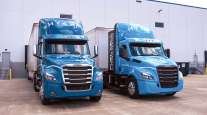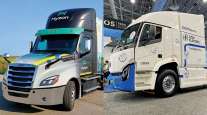Staff Reporter
Third-Quarter Loss Widens for Truck Maker Hyzon

[Stay on top of transportation news: Get TTNews in your inbox.]
Third-quarter losses at Hyzon Motors Inc. increased to $41 million from $25 million in the year-ago period as the Class 8 hydrogen fuel cell electric vehicle manufacturer ramps up toward the start of serial production.
However, Rochester, N.Y.-based Hyzon, which made its first commercial delivery to a drayage customer in the Port of Long Beach in November, managed to cut its operating expenses to $40.1 million in the third quarter from $53.6 million in the 2022 period.
“This was a remarkable quarter as Hyzon continues to accelerate the global transition to clean energy by developing and commercializing our proprietary, leading zero-emission fuel cell technology,” CEO Parker Meeks said in a statement.
Hyzon has now a total of 14 vehicles deployed, and the company raised the low end of its guidance to 15 vehicles deployed by year end, from its previous guidance of 10 to 20 vehicles.

Griffin
The company plans to begin testing the next generation of its Class 8 hydrogen FCEVs with U.S. customers in the first quarter of 2024, ahead of the start of serial production in the second half of the year, Pat Griffin, president of the company’s North American operations, told Transport Topics earlier in November.
The HYHD8-200 is an FCEV with a 200-kilowatt fuel cell and range of up to 350 miles. Hyzon is manufacturing test vehicles at its Bolingbrook, Ill., facility.
Hyzon will be able to produce 700 fuel cell systems per year when up and running at Bolingbrook, Meeks told analysts on a Nov. 14 conference call, and sees loosening bottlenecks boosting this number.

Meeks
The company expects that initial annual capacity to satisfy volume forecasts through 2025, with plans for capacity expansion by using lean production to mitigate bottlenecks and constraints.
Hyzon will look to build a 300-kW fuel cell once the 200-kW product is commercialized, with eyes on markets such as aviation ground support equipment, rail, mining and stationary power once the company’s heavy-duty truck is up and running, Meeks told analysts.
The current chassis for the HYHD8-200 is the Freightliner Cascadia in two day cab variants, but Griffin said Hyzon is not wed to one original equipment manufacturer.
Hyzon has an upfitting deal with Fontaine Modification and can use any cab or chassis, said Griffin, who once worked for Fontaine.
Want more news? Listen to today's daily briefing below or go here for more info:




